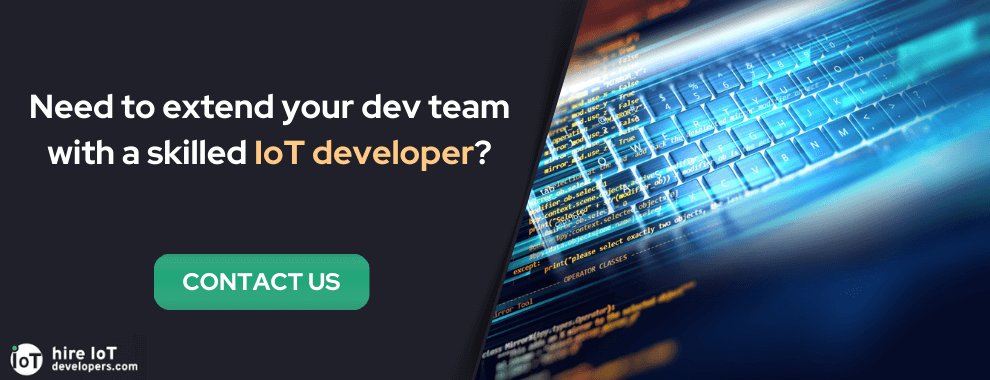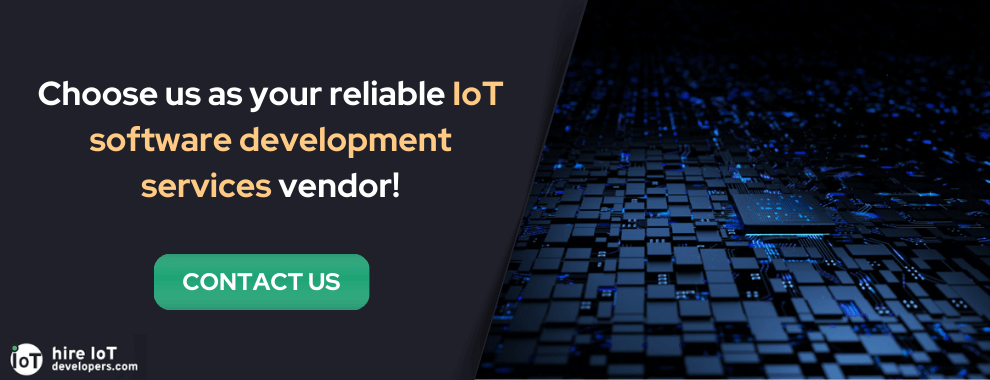Dedicated IoT Team for Hire
Options for Building Your IoT Team
The Internet of Things or IoT is growing at a rapid pace and IoT developers are in high demand. Putting together an IoT team to work on your company’s project may prove to be a difficult task.
A company assembling an Internet of Things team has three options:
Hire IoT developers as in-house employees
Many companies prefer to put together their own AWS IoT team or whatever type of IoT team they need in-house.
Pros:
- Face to face communication with your developers
- Team members are more likely to be a cultural fit for your company
- Complete control of the tools and processes involved.
Cons:
- Recruiting an IoT team in-house can be expensive
- Obtaining the best developers is difficult and can take several months
Hire freelance IoT developers
Assembling an IBM IoT team or another Internet of Things group using freelancers is an option.
Pros:
- Freelancers are typically easier to find and less expensive
- Flexibility in growing or downsizing your team
- Get developers from anywhere in the world
Cons:
- Most freelancing portals don’t have a strict screening process making it difficult to evaluate a developer’s skills
- Difficult to track the time spent by the freelancer on your project
- Potential communication difficulties
Use IoT outsourcing/outstaffing services
An option that is growing in popularity is to hire iot developers from outsourcing or outstaffing companies.
Pros:
- Easy to adjust team size based on a project current needs
- A wide variety of skills can be called on from large talent pools. You can quickly find an IoT specialist for any technical area
- Access to developers with extensive experience
- Faster turnaround times due to greater experience of team members
Cons:
- Differences in times zones can make scheduling meetings difficult
- Cultural differences can present communication difficulties
Going through an outsourcing/outstaffing company appears to be the best way to obtain IoT development services for your project.
Top 3 Countries in Eastern Europe to Build IoT Teams
Eastern Europe has become known for providing top IoT dev teams. The three best countries for IoT engineer remote workers and other IoT expert talent are Poland, Romania and Ukraine:
Poland
There are some definite advantages in seeking Internet of Things (IoT) services in Poland. Poland has a large pool of IT talent and adds around 40 thousand IT graduates every year. They are recognized for producing skilled IoT developers who are among the best in the world. Most Polish developers have good English skills and some speak several languages. The IT infrastructure in Poland is excellent and there is a good business environment. The only drawback to hiring IoT managed services teams is that their rates are at the high end for Eastern Europe and the demand for developers in their domestic market affects the outsourcing market.
Romania
Romania has a flourishing IoT outsourcing industry. They have a large pool of skilled talent to draw from although not as big as Poland or Ukraine. A wide variety of IoT services are available in many technical areas. Whether it’s a team IoT analytics that you need or other Internet of Things services you can find them here. Romanian developers are generally able to speak English and the county’s time zone works for Western Europeans and North Americans. The Romanian business market is favorable. The one drawback of outsourcing to Romania is they have a smaller pool of IoT developers to draw from than Poland and Ukraine.
Ukraine
Ukraine has a vast and varied pool of IoT talent to draw from. According to Ukraine Digital News, there are over 200,000 software engineers including 10,000+ C/C++ developers with around 40,000 IT and Engineering specialist graduates every year. Whether you need an Amazon robotics IoT development team or an Azure IoT team there is no doubt you can find exactly the developers you need in Ukraine. They also have one of the lowest rates in Eastern Europe as well as some of the most skilled developers. Ukraine has a 99.8% literacy rate and the majority of developers speak English. Location wise Ukraine is easy to travel to and their time zone allows them to work easily with Western Europeans and North Americans. The laws and business environment are also favorable.
IoT Developer Salary Rates
The cost to build an IoT team is determined in large part by the salaries paid to the developers. Salaries vary a lot depending on location, skill level and experience. The following are the median IoT salary rates in a variety of countries according to Payscale:
- United States: $130,000
- Canada: $82th
- United Kingdom: $70,400
- Germany: $82,300
- Denmark: $72,400
- Switzerland: $133,000
- Italy: $48,000
- Poland: $37,300
- Romania: $27,000
- Ukraine: from $14,400 to $48,000 (based on our research over a few local job portals)
Considering technical skill level and salary rates Ukraine is the most cost-effective solution for hiring IoT developer remote workers for your team.
About Our IoT Developer Services
We are a powerful nearshore IoT development team provider based in Ukraine. We have access to a huge pool of over 200,000 IoT software developers and IT specialists with a wide variety of technical skills and a vast amount of experience. Our teams have developed projects for companies all over the world. Benefits of using our company include:
- Cost-effective: provide highly skilled IoT developers at reasonable rates
- Variety of talent: able to provide IoT developers in any field
- Quick: can develop your team in as little as just 3 to 6 weeks
Our IoT Team Building Process
Our working model for building IoT development teams has proven to be very effective:
You:
- Provide your candidate profile
- Present us with the specific technical task
- Approve the selected candidate
Our Recruitment Team:
- Provides candidate CVs for evaluation
- Screens the best candidates in person
- Arranges video interviews with client
- Presents an offer
Our Resource Management Team:
- Onboards new employees
- Brands space to match corporate identity
- Maintains contact with you and developer to ensure no problems
IoT has transformed our daily lives and work, connecting an enormous number of devices and opening doors to new possibilities in automation and innovation. However, the development of IoT solutions is not without its challenges, including security and privacy concerns, data management issues, interoperability problems, scalability challenges, and cost considerations.
In this article, we will explore the major challenges facing IoT development projects and provide tips for effective collaboration both with an outsourced IoT team and freelance IoT designers. We will also discuss the key roles and skills required to hire a team for IoT project.
Inevitable challenges in IoT development projects
The Internet of Things (IoT) is a rapidly growing field that is changing the way we live and work. However, with the growth of this technology come a number of challenges that must be overcome in order to realize its potential fully.
- Security and privacy
Security and privacy are critical issues in IoT development. Ensuring that sensitive data transmitted over the network is protected against unauthorized access and cyber-attacks is a major challenge facing IoT developers. This requires a strong multi-layered approach, including encryption of data in transit, secure authentication of devices and users, and protection of the network from potential threats such as malware and hacking attempts
Moreover, regular security audits and penetration testing can help identify potential vulnerabilities and improve the overall security of IoT systems.
- Data management
Efficient data processing is crucial for IoT projects, as it helps in handling large amounts of data generated by connected devices. Think to hire BigQuery developers to ensure that your data storage and processing infrastructure can handle the increased demands on the system and can efficiently analyze data.
Proper data management also involves ensuring data privacy and security, including encryption, access control, and compliance with data protection regulations.
- Interoperability
Interoperability in IoT refers to the ability of different devices and systems to communicate and exchange data effectively and efficiently. The lack of standardization in the IoT industry, with various proprietary protocols and technologies being used by different manufacturers, creates challenges for seamless connectivity and data exchange between devices.
This not only hinders the flow of data between devices but also complicates system integration, leading to compatibility issues and data exchange errors.
- Scalability
With the increasing demands on infrastructure and systems in the rapidly growing IoT ecosystem, it may be necessary to hire an AWS developer. This will help to ensure scalability and address the challenges of handling and processing large amounts of data efficiently and securely. Efficient networking solutions can support the growing number of connected devices, and real-time data processing capabilities to handle large amounts of data in real time.
Addressing scalability challenges is critical for the success of IoT projects, as it enables the infrastructure and systems to accommodate the growth of the IoT ecosystem and changing requirements.
- Cost
The cost of implementing and maintaining IoT solutions can be a significant challenge for some organizations. IoT projects often involve multiple components such as connected devices, sensors, data storage and processing infrastructure, and networking solutions, each of which can add to the overall cost of the project. The cost of IoT can be particularly challenging for small and medium-sized organizations with limited resources, making it difficult for them to fully realize the benefits of IoT.
To mitigate cost challenges, organizations need to carefully consider the cost implications of IoT projects and make informed decisions about investments in IoT solutions, taking into account the benefits and costs over the long term.
Tips for using an outsourced IoT team effectively
Outsourcing an IoT team can offer organizations a cost-effective and flexible solution for developing IoT solutions. To maximize the benefits of internet of things consulting company, businesses should follow these tips for effective collaboration.
- Define project requirements
Clearly define the specific IoT requirements, goals, and objectives of the project to ensure the outsourced team understands the project scope.
- Ensure data security
Make sure that appropriate data security measures are in place to protect sensitive IoT data and communicate these measures to the outsourced team.
- Collaborate on IoT architecture
Collaborate with the outsourced team to define the overall IoT architecture and ensure compatibility with existing systems and processes.
- Provide access to relevant IoT tools
Provide the outsourced team with access to relevant IoT tools and technologies to support their work.
- Regularly review IoT performance
Hire AWS engineer to review the performance of the IoT system to ensure it is meeting project requirements and make any necessary adjustments.
- Encourage continuous improvement
Encourage continuous improvement of the IoT system by actively seeking feedback from users and collaborating with the outsourced team to implement improvements.
- Foster a culture of innovation
Foster a culture of innovation within the outsourced team to encourage the development of new and improved IoT solutions.
- Maintain IoT system documentation
Maintain comprehensive documentation of the IoT system to facilitate future updates and maintenance.
Roles and skills in an IoT team
IoT cloud application development requires specialized skills and knowledge to ensure the security, scalability, and efficiency of IoT systems and infrastructure:
- IoT Solutions Architect
Defining the overall IoT architecture and design. They ensure that all IoT components and systems are integrated and aligned with business goals and technical requirements.
- IoT Developer
Developing IoT applications and integrating IoT devices with existing systems. They must have expertise in programming languages, software development, and IoT technology.
- IoT Data Scientist
Analyzing and processing IoT data to extract insights and make informed decisions. They must have expertise in data analysis, machine learning, and data visualization.
- IoT Network Engineer
Designing and managing IoT networks and ensuring network security. They must have expertise in network design, network security, and IoT networking protocols.
- IoT Project Manager
Planning, executing and delivering IoT projects on time and within budget. They must have expertise in project management, risk management, and team management.
- IoT DevOps Engineer
Hire AWS developers with expertise in IoT development to effectively address scalability challenges in IoT projects, such as automating and optimizing IoT deployment, testing, and operations. They must have expertise in DevOps practices, continuous integration, and continuous delivery.
- IoT Product Manager
Defining IoT product strategy and ensuring product-market fit. They must have expertise in product management, market research, and customer insights.
- IoT Security Expert
Ensuring the security of IoT devices, networks, and data. They must have expertise in security protocols, encryption, and cyber-security.
- IoT Business Analyst
Analyzing the business value of IoT solutions and defining IoT use cases. They must have expertise in business analysis, process optimization, and data-driven decision-making.
- IoT User Experience (UX) Designer
It’s necessary to hire IoT designers with UX design and user research skills to create user-centered IoT solutions that meet user needs and expectations.
Conclusion
Internet of Things is transforming the world, but its development is not without challenges. By understanding them and effectively collaborating with an IoT app development consulting team with the right skills and roles, organizations can overcome these obstacles and achieve success in their IoT initiatives.
Take the next step in IoT development. Apply the tips and insights shared in this article to drive success in your IoT project and unlock the benefits of connected technology. Start your journey today!


